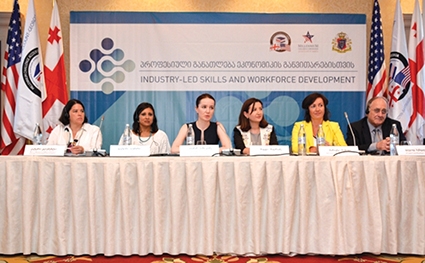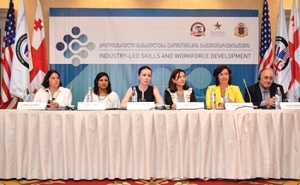Meeting the Demands of the Industry
The Industry-led Skills and Workforce Development (ISWD) is a USD 16 million project of the Millennium Challenge Account-Georgia, funded under the second USD 140 million Compact between the Millennium Challenge Corporation (MCC) and the Government of Georgia.
This Project is implemented in collaboration with the Ministry of Education and Science of Georgia. The project started in September 2014 and will continue until March 2019.
It aims to address the gap between the need of the labor market for skilled personnel and the supply of workers with the required technical skills. The project supports the development of industry-relevant programs and the capacity of technical and vocational education and training (TVET) providers.
There is an emphasis on skills development in the areas of science, technology, engineering and mathematics (STEM) which are considered vital for Georgia’s future economic development. A consultation session with the semi-finalists of the Program Improvement Competitive Grants (PICG) scheme was held at Rooms Hotel Tbilisi in December.
At the session, the participants received clarifications based on their interests and questions. The meeting was opened by Magda Magradze, CEO of MCA – Georgia, Kateri Clement, Millennium Challenge Corporation Resident Country Director and David Handley, Team Leader, ISWD, and attended by shortlisted applicants, including the representatives of TVET sector, industry and non-governmental organizations.
Magda Magradze, CEO of Millennium Challenge Account Georgia: Millennium Challenge Account – Georgia (MCA-Georgia) is implementing a vocational education project in Georgia aiming at human capital development and enhancement in the most important sectors of Georgia’s economy. We have done preliminary studies to find out where the major demand from the labor market for vocational education and the skilled professionals is. Consequently, based on the findings of the study, we have prioritized STEM, agriculture and tourism sectors eligible for the grants facility to enable vocational education providers to strengthen existing and develop new programs and address the industry and employers needs in contributing to the growth of Georgia’s economy.
How many applicants have you received?
We received a large number of applications for the first stage which was carried out early 2015. By the announced deadline 70 concept paper proposals had been submitted with the overall requested grant amount of USD 69 million. The total budget amount of all submitted applications is more than USD 90 million of which the co-financing from the industry reaches USD 21 million, quite an unprecedented amount for the Georgian context. In October 2015 the Technical Evaluation Committee and international experts screened and evaluated the received proposals and revealed 29 shortlisted semi-finalists with the total requested grant amounted to USD 38 million. However, the shortlisted applicants will compete for up to USD 12 million in grants, with grant sizes ranging from USD 300,000 - 3 million per proposal. The ISWD project is managed by the German international firm PEM Consult that has been hired by MCA-Georgia to administer this grant facility.
Who are the beneficiaries?
The program targets both public and private vocational-education providers, offering partnership with private sector and industries in the fields I mentioned earlier. PEM Consult received applications from vocational education centers and colleges as well as local and international universities, which offer vocational education programs.
How many years is it set to last?
The Millennium Challenge Account – Georgia was established in 2012 with the mission to implement Georgia’s Second USD 140 million Compact with the Millennium Challenge Corporation. Over five years, MCA will implement programs in general, vocational, and higher education, focusing on increasing the quality of STEM education and developing human capital in those fields.
The main aim of the ISWD project is to develop high-quality vocational education programs in Georgia, which on the one hand will increase the employability of its graduates with higher salaries, and on the other hand, assist employers to recruit a qualified workforce as is currently in demand.
Vocation education providers, which will be selected and financed by the MCA grants, may develop and implement programs up to 24 months within the scope of the ISWD project. We strongly believe that by offering this outstanding grant facility, the Georgian vocational education system will strengthen and enable students to acquire the modern skills needed to reduce unemployment and develop Georgia’s economy.
Giorgi Khokhobashvili – a beneficiary, Executive Director of Georgian Research and Development Foundation: Our foundation, which is known to the public as a GRDF, is a Georgian Research and Development Foundation that was founded in 2001, in Washington, on the initiative and with the financial assistance of CRDF. CRDF Global is an independent nonprofit organization that promotes international scientific and technical collaboration between the United States and the countries of the Former Soviet Union (FSU) and was authorized by the U.S. Congress in 1992. We implement US government programs in Georgia in science and technology. Our aim in this project is to establish a vocational education center in wireless technology in partnership with Auburn University, USA.
What is the scope of the project you have submitted?
Within the framework of our proposed project, we will prepare a workforce in wireless technology that can be used in agriculture. Georgia has a shortage of qualified workers in this field and the demand for wireless technology professionals is high, not only in Georgia but abroad, too. Our program will be a unique one, as it will offer ABET (Accreditation Board for Engineering and Technology) accredited educational programs. What’s more, we have a well-established partnership with the industry, since collaboration with the private sector is vital for vocational education. As we know, the primary goal of vocational education is to prepare a skilled labor force that is responding to industry demands.
Meri Taliashvili











